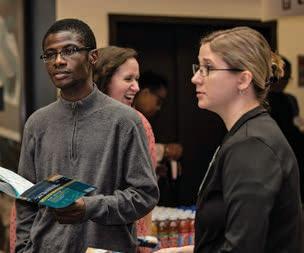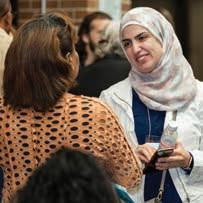Tri-C® Adjunct Faculty Conference
Emerging Stronger: Renewed Confidence with Teaching and Learning
Saturday, March 25, 2023

ct
es
Adjun
Serv ic
The 2023 Cuyahoga Community College (Tri-C®) Adjunct Conference committee welcomes faculty and staff from colleges and universities throughout Ohio for today’s virtual conference. We are pleased to support professional development for college faculty as we respond to the changes in higher education and “Emerge Stronger.”

This conference explores the teaching and learning landscape to find transformative ways to support students, faculty, staff and administration as they navigate continuous change. Thank you to our presenters who are allowing us to offer 12 concurrent sessions to share with you today. We appreciate your time and expertise.
We would also like to thank adjunct faculty for the vital role they play in student success across all institutions of higher education. We hope today provides you with the opportunity for professional and personal growth.
Sincerely,
2023 Adjunct Conference Committee

“The duties of a teacher are neither few nor small, but they elevate the mind and give energy to the character.”
— Dorothea Dix
Schedule of EVENTS
9 - 9:45 a.m.
Welcome and Opening Remarks
Karen Cross-Hatten
Adjunct Services Manager, Moderator
Michael Baston President, Cuyahoga Community College
Karen Miller
Provost and Executive Vice President, Access, Learning & Success, Cuyahoga Community College
Todd Kitchen
Campus President, Eastern Campus
Denise McCory
Campus President, Metropolitan Campus
Lisa Williams
Campus President, Western Campus
Scott Latiolais
Campus President, Westshore Campus
Shana Marbury
Executive Vice President, Workforce, Community and Economic Development Division (WCED)
10 - 10:45 a.m.
Concurrent Session A

11 - 11:45 a.m.
Concurrent Session C
Concurrent Session B Noon - 12:45 p.m.
2023 Adjunct Conference Committee
Sara Williams, Co-Chair
Karen Cross-Hatten, Co-Chair
Peter Anderson
Jacquelyn Arendt
Angela Baker
Sabrina Cali
Rebecca Carte
David Crowell
Kara DePaul
Adam Diiulio
Mike Donato
Sonja Elekhtaby
Special Thanks
Television and Video Production Information Technology Services (ITS)


Adjunct Services

Conference host Metropolitan Campus
Brian Hall
Christine Hickey

Gayatry Jacob-Mosier
Dennis Joyce
Diane Nickoson
Antonina Pakholkova Mohamed
Sarah Pogell
Brad Scott
Shamuire Spivey
Leanne van Beers-Werneke

Olivia Villasenor
Robin Williams
Sessions at a Glance
Click the hyperlinked titles for session descriptions and links to join.
Welcome and Opening Remarks
9 - 9:45 a.m.
Karen Cross-Hatten
Michael Baston
Karen Miller
Todd Kitchen
Denise McCory
Lisa Williams
Scott Latiolais
Shana Marbury
Concurrent Session A
10 - 10:45 a.m.
A1 Technologies for Connecting Students With Instructors/Peers and With Content
A2 Reengaging Students With Their Peers: Strategies for Addressing COVID-Era Social Habits

A3 Transformation During Crisis: Building Resilience and Self-Efficacy Through Transformative Coaching
A4 Fall in Love With Reflective Writing
Concurrent Session B
11 - 11:45 a.m.
B1 Student Podcasting: Enhance Student Learning by Transforming Confidence in Teaching
B2 Using Extracurricular Events to Build Community in the Classroom
B3 The 9Ps Program: Calling on Ambassadors to Promote Student Success
B4 Building Strength With Teaching and Learning Through Outcomes Assessment
Concurrent Session C Noon - 12:45 p.m.
C1 Exploring Research and Scholarship in the Humanities Through Consortium Projects
C2 Growth Mindset: A Key Component to Confidence in Learning
C3 Restoring Fun and Interest to the Teaching and Learning Landscape
C4 Renewed Confidence With Teaching and Learning: Learning to Refill My Bucket
Presentation Pathways
Concurrent sessions are organized by Presentation Pathways, as described below.
Teaching and Learning Strategies

Engage and explore effective practices such as active learning, innovative teaching techniques and student engagement.
Curriculum and Assessment

Discuss opportunities to incorporate critical thinking in course design, learning outcomes and assessment strategies.
Faculty Scholarship and Engagement


Engage in reflective practices with peers to build and strengthen the teaching community, including the integration of Scholarship of Teaching and Learning (SoTL), personal growth and student development.

Technology for Teaching

Explore various technologies to support student learning.
Diversity and Inclusion

Appreciate and recognize the value in diverse perspectives with strategies to support learners both inside and outside the classroom.
Student Success
Identify and promote services, resources and success initiatives available to students.

Concurrent Session A
10 - 10:45 a.m.
Click the hyperlinked title to join the session.
A1 Technologies for Connecting Students With Instructors/ Peers and With Content
Teaching an online course? Or do you want to use online technologies in your face-to-face course? The deeper and more personal the connections we have with our students, the more motivated they are to learn. And the more students participate in their own learning, the better it “will stick.” This session will focus on student interactions with peers, instructors and the content. Discover and share ideas on how integrating technology tools and techniques will increase connections and interactions with our students and provide them with opportunities to strengthen their interactions with the content.
Karen Gray, Adjunct Faculty, Education, Cuyahoga Community College
At the end of this session, attendees will be able to:
1. Identify technology options to increase students’ connections with their instructors and peers
2. Identify technology options to increase online students’ engagement with content



3. Select from a variety of technologies and determine which options work best for teaching and learning

A2 Reengaging Students With Their Peers: Strategies for Addressing COVID-Era Social Habits

Following the pandemic and the return to the classroom, students’ expectations of peer review, class discussion and collaborative work shifted drastically. Students have struggled to connect with each other and may feel a sense of “awkwardness” while interacting with their peers. This presentation addresses this issue, as student-to-student interaction is important for their sense of validation, connection and success. Strategies covered in this session include the following: utilizing icebreakers, incorporating regular collaborative work, altering peer review practices, representing diverse identities through course material selection, engaging students in discourse and setting clear social expectations for class discussion. The presentation will be followed by a discussion with the audience.
Katie Laskowski, Adjunct Faculty, English, Cuyahoga Community College
At the end of this session, attendees will be able to:
1. Recognize how the pandemic has impacted students’ interactions with one another for in-person or blended classes
2. Identify collaborative work and discussion strategies that make students feel more comfortable working with their peers
3. Understand the benefits of a peer learning model
A3 Transformation During Crisis: Building Resilience and Self - Efficacy Through Transformative Coaching
Life can be messy, and it can be difficult to know where the boundaries exist. Staff and faculty are hesitant to get “too involved” in between students’ academic and personal lives. Transformative coaching builds a bridge. During this interactive coaching session, we will share preliminary findings of a pilot project that was developed to offer evidenced-based coaching services and remediation plans for nursing students at risk for not achieving program completion and/or a first-time pass score of the National Council Licensure Examination (NCLEX) for registered nurses. The foundational concepts of transformative coaching align internal motivation with external behavior and provide a framework that benefits all disciplines, academic programs, and individuals. Participants will be equipped with coaching strategies for the classroom.
Susan Morris, Adjunct Faculty, Nursing, Southern State Community College
At the end of this session, attendees will be able to:
1. Define the four pillars of transformative coaching and identify one coaching intervention that can be implemented in their classroom
2. Identify four support layers that insulate student success and one area they would like to impact

3. Identify support strategies to address risk factors before they become a barrier, and address existing barriers that impact academic success
A4 Fall in Love With Reflective Writing
How do we help our students process what they’ve learned? How do we help students analyze material and utilize it in their daily lives? Through reflection! Reflective writing allows students to engage with material and texts in a low-stakes way, to think about how to add new knowledge to previous knowledge, to incorporate new information into the future and to acknowledge what questions they may have. Reflective writing helps faculty understand what students are taking away from classes, how they’re preparing for exams and papers, and how faculty can assist in those processes. Faculty can feel more confident about what is happening in their classrooms and in their students’ learning. In this session, we’ll work on when and how to incorporate reflective writing, as well as language to use while crafting these assignments.
Donna Hunt, Adjunct Faculty, English, Lorain County Community College
At the end of this session, attendees will be able to:
1. Use varied techniques for reflection in the classroom

2. Apply reflection questions to their specific disciplines and classes
3. Develop a plan for including reflection and incorporating that information and data into their course design

Concurrent Session A | 10 - 10:45 a.m. (Cont.)
Concurrent Session B
11 - 11:45 a.m.
Click the hyperlinked title to join the session.
B1 Student Podcasting: Enhance Student Learning by Transforming Confidence in Teaching

During this interactive session, Monica Starks, a Cuyahoga Community College sociology adjunct faculty member, will share how she introduced an innovative podcasting feature to enhance student learning in her introductory sociology course. The presenters will provide an overview of how students used podcasting to explore a social problem specific to their community. Through the use of interactive communication technology, students learned critical thinking skills as they researched, conducted interviews, produced podcasts, and presented to stakeholders. A demonstration of the Flip software used in this innovative course project will be provided.
Monica Starks, Adjunct Faculty, Sociology, Cuyahoga Community College
Casey Brown, Senior Instructional Designer, Center for Learning Excellence, Cuyahoga Community College
At the end of this session, attendees will be able to:
1. Use new interactive communication technology in the classroom for all learning modalities



2. Provide a renewed sense of confidence in teaching while enhancing student learning
3. Support students by determining where they are and how to overcome obstacles through personalized activities
B2 Using Extracurricular Events to Build Community in the Classroom
Building a community of learning outside of the classroom is even more important after the pandemic. Students are struggling to connect with other students and can have a hard time building new friendships after years of social distancing. The goal of IT Days is to build student engagement and rapport between peers. These events focus on building onto skills learned in the classroom through interactive projects, seminars and, at the end of the semester, a skills competition focused on students’ final class projects. The presenters will discuss how they created a community of learning through extracurricular events that are focused on student learning.
Mike White, Associate Dean and Assistant Professor, Technical Programs, Marion Technical College
Ks Ku, Professor, Information Technology, Marion Technical College
At the end of this session, attendees will be able to:
1. Plan for extracurricular events related to their major
2. Brainstorm ideas for replication
3. Learn how to engage students across the curriculum

B3 The 9Ps Program: Calling on Ambassadors to Promote Student Success
The 9Ps Program began as a campus retention program during the onset of the pandemic in 2020. The presenters will discuss each of the 9Ps, which are tangible elements that each student needs to have in place to be successful. The presenters will provide an overview of how this program has transformed over the past two years and how it has impacted the culture of retention at the campus. Participants will be provided with information on how they can apply the 9Ps with students inside and outside of the classroom. As these elements are put in place, students should be more successful. The students’ success will help increase the faculty’s confidence in their ability to teach and connect students with support services.
Jenea Weems, Director, Enrollment Center and Adjunct Faculty, General Studies, Cuyahoga Community College
Felisa Eafford, Dean of Access and Completion, Cuyahoga Community College
At the end of this session, attendees will be able to:
1. Identify and define each of the 9Ps
2. Describe the framework from which the 9Ps model was developed
3. Become 9Ps Ambassadors and promote student success through a classroom assignment
B4 Building Strength With Teaching and Learning Through Outcomes Assessment
The goal of the Tri-C’s outcomes assessment efforts is to create a college culture that measures student learning, finds ways to help students improve and embraces change that makes improvement possible. This workshop explores how Tri-C assesses outcomes at three levels: course, program and institution (i.e., Essential Learning Outcomes or ELOs). Attendees will learn how adjunct faculty are an important part of course-level assessment and explore the “Align-It-All” initiative – a program to assist faculty in aligning courses to the selected ELOs for each year, creating a large and diverse pool of artifacts for assessment.
Anne Distler, Professor, Chemistry, Cuyahoga Community College
Amanda Nolan, Program Manager, Learning Outcomes Assessment, Cuyahoga Community College
Bridget Kriner, Associate Professor, English, Cuyahoga Community College
Joseph Amschlinger, Adjunct Faculty, Communication Studies, Cuyahoga Community College
Justin Miller, Assistant Professor, Philosophy, Cuyahoga Community College
Donya Waugh, Assistant Professor, Psychology, Cuyahoga Community College
At the end of this session, attendees will be able to:
1. Define the purpose of outcomes assessment at institutional and course levels

2. Recognize how course-level outcomes assessment benefits both faculty and students


3. Describe how adjunct faculty are part of the Align-It-All initiative and the course-level assessment initiative

Session B | 11 - 11:45 a.m. (Cont.)
Concurrent
Concurrent Session C
Noon - 12:45 p.m.
Click the hyperlinked title to join the session.
C1 Exploring Research and Scholarship in the Humanities Through Consortium Projects
The Cleveland Humanities Collaborative (CHC) is a grant-funded program intended to promote education and career efficacy in the humanities between Tri-C and Case Western Reserve University. This session is about one of the facets of the grant: consortium projects. These projects are joint ventures between students and faculty members at Tri-C and other Northeast Ohio institutions of higher education where students and faculty engage in research and scholarship together. In this session the presenters will provide an overview of the consortium project process, some examples and benefits for both students and faculty.
Andy Sokolich, Program Manager, Online AA and Adjunct Faculty, General Studies, Cuyahoga Community College
Alexandria Romanovich, Assistant to the Executive Vice President, Access Learning & Success, Cuyahoga Community College
At the end of this session, attendees will be able to:
1. Describe the benefits of completing a consortium project with a student
2. Identify possible research topics for a consortium project with a student


3. Apply what was learned in this session to engage in a consortium project with a student



C2 Growth Mindset: A Key Component to Confidence in Learning
Addressing the effective domain for community college students is critically important for traditionally underserved student populations. These students often arrive with a fixed mindset developed throughout their K-12 schooling, crippling their sense of autonomy and agency, as well as their ability to think and act for themselves. Participants will learn how implementing a growth mindset approach has been proven to reshape students’ perceptions of the learning process and their abilities as learners to emerge as stronger scholars.
Sarah Szweda, Adjunct Faculty, Media and Journalism Studies, Cuyahoga Community College
At the end of this session, attendees will be able to:
1. Better understand and communicate the types of challenges faced by students from traditionally marginalized populations
2. Define the differences between fixed and growth mindsets and explain how students acquire these different mindsets over the course of their educational experiences
3. Identify strategies and interventions that they can implement in their courses to help their students develop a growth mindset
C3 Restoring Fun and Interest to the Teaching and Learning Landscape
For instructors who find themselves caught in a teaching rut, doing the same thing semester after semester, this session will introduce creative ways to improve their teaching strategies, better connect with students and enhance student engagement. Acquired knowledge about effective teaching and learning strategies through years of instruction inside Ohio correctional facilities will be shared to help reinvigorate and reinspire participants. We continually learn creative ways to navigate the teaching landscape without the benefits of student access to the Internet and other technological conveniences. During this session we will share strategies that make teaching and learning interesting and fun. We will discuss how to incorporate handson activities, real-life experiences, role-playing, reversed classroom exercises, peer reviews and other methods to enhance teaching and learning.
Micah Dorsey, Adjunct Faculty, Leadership, Marion Technical College
Maryjo Mundey, Adjunct Faculty, Human Resources Management, Marion Technical College
Rhea Edmonds, Correctional Education Program Director, Marion Technical College
At the end of this session, attendees will be able to:
1. Overcome obstacles to effective teaching in conventional and nonconventional settings

2. Facilitate engaging classroom and online discussions


3. Feel reenergized and reinspired about teaching and learning
C4 Renewed Confidence With Teaching and Learning: Learning to Refill My Bucket
Rest and self-care are so important. When you take time to replenish your spirit, it allows you to serve others from the overflow. You cannot serve from an empty vessel. In this interactive session, participants will be encouraged to schedule daily renewal. And, the presenters will share the dipper and bucket metaphor which can be used to increase focus on joyous moments in work and life while reducing focus on the negative.
Patrice Gillespie, Associate Professor, Business and Economics, University of Cincinnati-Blue Ash
Cindy Jones, Adjunct Faculty, Business and Economics, University of Cincinnati-Blue Ash
At the end of this session, attendees will be able to:
1. Utilize the understanding of the bucket theory to tap into their own “bucket” and identify what rest and care would benefit them
2. Utilize the tools learned to contribute to the care ethic of their learning community by supporting others in refilling their buckets
3. Identify early warning signs of feeling depleted and needing one’s bucket refilled
Concurrent Session C | Noon - 12:45 p.m. (Cont.)
Information and Upcoming Events

Tri-C Adjunct Services Virtual Office Hours and Contact Information

• Eastern Campus: Fridays, noon-1 p.m. | Sonja Elekhtaby, Manager
• Metropolitan Campus: Fridays, 10:30-11:30 a.m. | Karen Cross-Hatten, Manager

• Western Campus: Wednesdays, noon-1 p.m. | Angela Baker, Manager
• Westshore Campus: Mondays, noon-1 p.m. | Dennis Joyce, Manager
Adjunct Faculty Appreciation: Making a Difference Every Day
This Collegewide virtual event recognizing the dedication and teaching excellence of Tri-C’s adjunct faculty for the 2022-2023 academic year will launch in April. In addition, be sure to stop by your Campus Adjunct Services office April 17-19 for special treats and giveaways. Watch for more details coming soon!
Faculty Development Calendar
Tri-C is committed to helping faculty grow and develop at every stage of their careers. The Office of Academic Professional Development (also known as Faculty Development) collaborates with several Collegewide and campus-based departments to support ongoing training and development needs for all full-time and adjunct faculty. Find upcoming faculty development opportunities here!
Adjunct Faculty Stipend Program
The Adjunct Faculty Stipend Program provides an opportunity for Tri-C adjunct faculty to enhance their success in the classroom and promote engagement in the Tri-C community while providing a financial incentive of $500. These stipend-eligible categories are designed to focus on interdisciplinary, pedagogy and technology competencies. Click here to find out more about the program. Reminder: There is one more deadline for stipend submissions this year: April 21.
AdjunctNation.com
Adjunct Services has subscribed to this professional development resource. Contact your respective Adjunct Services office for details.
SAVE THE DATE! Ohio Association of Two-Year Colleges (OATYC) Conference
The 2023 Ohio Association of Two-Year Colleges (OATYC) Annual Conference will be held on Friday, Oct. 6, at Lorain County Community College. Watch for more details coming soon!
Excellence in Teaching Award
in Honor of Ralph M. Besse

The annual Excellence in Teaching Award in Honor of Ralph M. Besse recognizes Tri-C faculty collegewide for their commitment to academic integrity, stimulation of intellectual development and investment in students within and beyond the classroom. Congratulations to the 2022 award winners!

2022 Adjunct Faculty Winners: Sue Dieterich
Adjunct Faculty, General Studies/Counseling Metropolitan Campus

Holly Gast Adjunct Faculty, Communications Studies Eastern Campus
Alan Green Adjunct Faculty, Humanities Western Campus
Oksana Melnychenko Adjunct Faculty, Music Eastern Campus
21-0887
Pictured L-R: Dr. Karen Miller, Provost/EVP, Access, Learning and Success, Cuyahoga Community College, Sue Dieterich, Holly Gast, Oksana Melnychenko, Alan Green and Dr. Michael Baston, President, Cuyahoga Community College



























